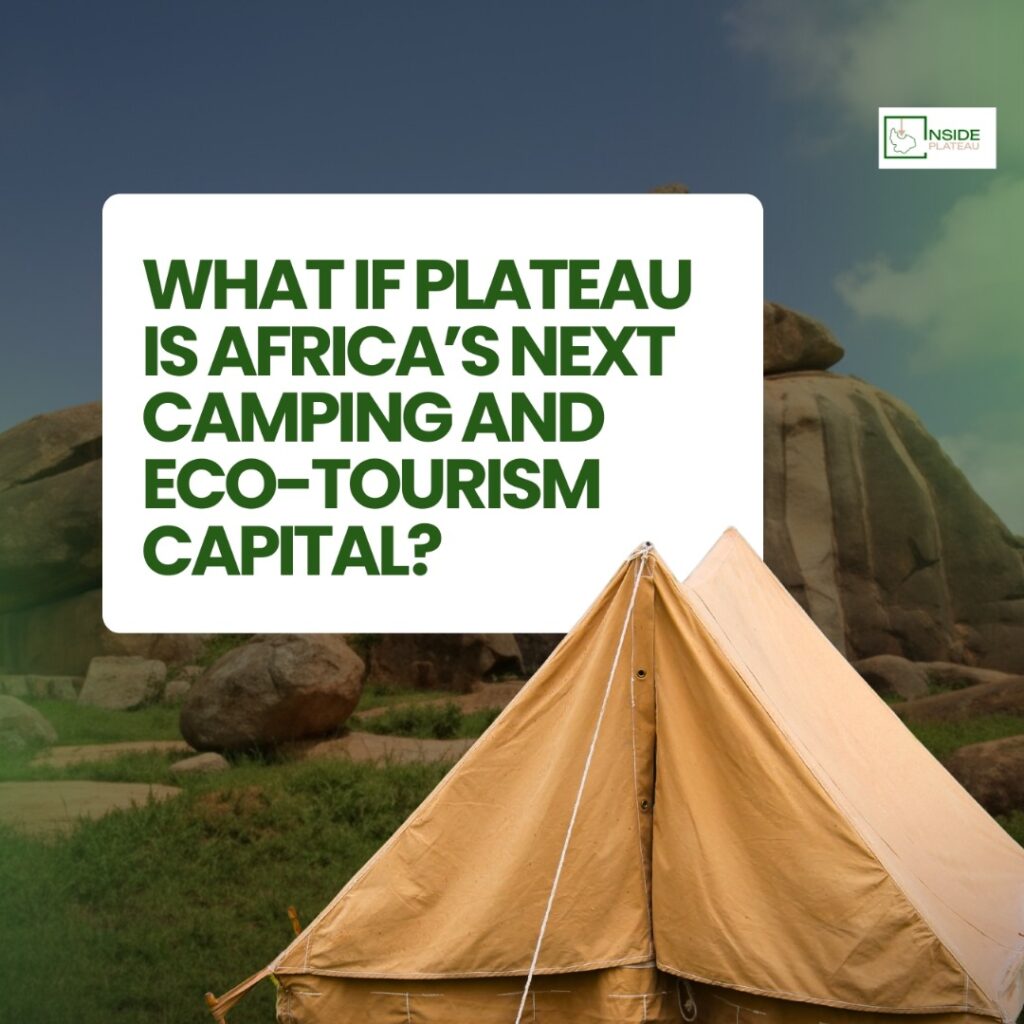Who says you need to fly to Kenya for a safari or to South Africa just to “experience nature”? Who says adventure must come with an international passport or a fancy visa? Who says you can’t pitch a tent, light a bonfire, and fall asleep to the hum of the earth, right here, in our own Plateau State?
Because maybe, just maybe, the next big thing in African eco-tourism is not thousands of miles away, but is sitting right here, in Nigeria’s cool, calm, naturally blessed backyard.
So, what if Plateau State with its crisp air, wild rocks, and highland magic became Africa’s next camping and eco-tourism capital?
A Weekend Escape: Plateau Style
Picture this: it’s Friday evening. Abuja is already tired of itself, Kaduna is wrapping up meetings, and your WhatsApp group chat is buzzing with the question, “Are we moving or not?”
You pack your weekend bag—hoodie, camera, and snacks that will probably finish before you even hit the expressway. No flights, no airport wahala; just good company and a road that leads to ‘Camp Plateau’.
By sunset, you’ve entered a valley that looks like something straight out of a nature documentary. Crickets are singing backup vocals, the air is cold enough to make you hug yourself, and fireflies are doing light work. Someone lights a bonfire, another person starts passing around big mugs of hot tea, and suddenly, you realize: this is peace. That’s Friday night.
Saturday morning? Action time. A sunrise hike through Shere Hills where every photo looks like a screensaver. A group of locals leading the way, telling stories about the rocks that “look like lions if you squint small.” After that, it’s a dazzling train ride across the plains, lunch with Plateau’s finest delicacies served hot, and a quick nap under a tree that looks like it’s seen generations.
By evening, the camp comes alive. Bonfire. Drums. Local dancers swirling in traditional attire. The chef flips roasted corn like it’s an Olympic sport. An orchestra of untuned voices rises in familiar songs, the instrument of palm against palm echo in synchrony and a game follows to form a rich blend of entertainment. For the next couple of hours, you forget you have a phone and a job or responsibilities outside of this vicinity. And if you listen closely enough, you can hear your body unwind and become a seamless part of nature.
Naturally, Sunday morning comes softly. Birds are gossiping in the trees, the mist is doing its thing, and breakfast smells like roasted plantain and local coffee. Nobody wants to leave. But alas, reality calls. You drive back to Abuja or Kaduna smiling, your phone full of photos, your mind full of peace, and your heart whispering: “Next weekend again?”
Now, imagine hundreds of people doing this every weekend. This is not a dream. It’s a billion-naira idea just chilling on Plateau’s doorstep, waiting for somebody to say, “Let’s do it.”
The Global Playbook: What Kenya and South Africa Knew
Here’s the gist. In the 1980s, Kenya realized something powerful: tourists weren’t looking for luxury, they were looking for life. They wanted to feel something real. So, Kenya gave the world the safari dream (dust, sunsets, animal roars, and all).
Fast-forward to 2023, and tourism alone now adds over Ksh1 trillion (₦8.2 trillion) to Kenya’s GDP. Over 1.5 million people earn their living from it. And guess what? Safari tourists spend about 40% more per day than the average traveler.
South Africa wasn’t left behind. Its safari and wildlife tourism now generate $7.8 billion yearly, making up 4.2% of the national GDP, and employing more than 640,000 people.
How did they do it? They didn’t just sell landscapes. They sold stories and moments that money can’t buy.
Now, look at Plateau: cooler weather than most of Africa, hills that look like movie sets, waterfalls that sing better than half the musicians on your playlist, and a people whose warmth could melt even Jos cold. If Kenya and South Africa built billion-dollar industries on nature, what is stopping Plateau State?
Why Plateau State Is the Perfect Frontier
Let’s be honest: Plateau State is God showing off. The weather alone is a national treasure. Cool breeze, sweater-worthy nights, and morning fog that looks like heaven forgot to close its door. Add that to the scenery (Riyom Rock, Shere Hills, Wase Rock, Kurra Falls, Pandam Wildlife Park, and the glittering mining lakes of Barkin Ladi) and you’ll start to wonder why there isn’t already a tourism rush.
Plus, we’re right in the middle of Nigeria. From Abuja, Kaduna, Bauchi, and Nasarawa, you can reach Jos in 3–5 hours by road. That is a potential weekend market of over 20 million people who are one road trip away from bliss.
Now, imagine a Camp Plateau Network: a collection of themed camps scattered across the state.
Camp Plateau, Jos: cozy glamping tents, music nights, and easy family fun.
Camp Plateau, Qua’anPan: for the birdwatchers and quiet souls.
Camp Plateau, Riyom: culture, cuisine, and storytelling by firelight, etc.
Each camp offers weekend adventure packages (Friday–Sunday or Friday–Monday). Clean tents, solar lights, guided hikes, photography safaris, bonfires, and food so fresh it might still be growing that morning.
And here is the magic: everything comes from the people. Local farmers supplying food, local cooks serving it, local artisans selling crafts, local youth working as guides, drivers, and event hosts. Leisure becomes livelihood and tourism becomes teamwork.
The Numbers Don’t Lie
Let’s do the math. If Plateau captures just 1% of Kenya’s domestic nature-tourism value, that’s about ₦80 billion yearly in direct spending on accommodation, food, transport, crafts, and logistics.
To this effect, each 100-tent camp could employ 80–100 locals. Ten camps? That’s 1,000 direct jobs plus another 4,000–5,000 indirect ones through supply chains and services.
And guess what? It doesn’t take skyscrapers or billion-dollar buildings to make it happen. Just smart design, clean water, solar lights, and proper marketing. Low overhead. High reward. Endless potential.
And the best part? The demand never runs out. Because people will always need to escape noise, stress, and bad network coverage. This isn’t just business. It’s therapy, culture, and community, all rolled into one.
What Camp Plateau Really Sells
Camp Plateau won’t just sell weekends.
It would sell peace of mind, hope to dreamers, rest to the tired, belonging to the disconnected.
Consequently, every bonfire becomes an economy. Every tent becomes a story. Every visitor becomes an ambassador. Imagine Lagosians posting photos of Shere Hills with captions like: “You don’t have to leave Nigeria to touch heaven.” That’s free advertising. And with the right push from government partnerships to travel influencers, and local investors, Plateau State could easily become Nigeria’s weekend capital.
More Than an Idea, a Reawakening
Plateau State has always been special. From the creativity in its people to the calm in its air. But this is a new story waiting to be written. A story that says, “We are not just beautiful; we are open for adventure.”
Because honestly, Plateau State is a vibe. It’s where the sun rises slow and the breeze has manners. Where roasted corn tastes better (we don’t know why, it just does). Where every rock seems to whisper, “Come and see what peace looks like.”
So, imagine a Plateau where every weekend, bonfires light up the skyline; farmers, cooks, and guides earn from the land they love; young people don’t have to leave (they build right here); tourists drive up from across Nigeria, chasing fresh air and freedom.
That is not a fantasy. It’s a plan waiting for action.
The Final What-If
So what if every Friday night, the Plateau hills glowed with laughter and firelight? What if you could stand at Riyom Rock, coffee in hand, watching dawn break over a valley of tents? What if every guest who came for three days left with a story that would last a lifetime?
What if, ten years from now, we all looked back and said, “That was when Plateau found its rhythm again. That was when Nigeria rediscovered its wild.”
Because the real question was never whether it could happen. The real question is “Who says it can’t?”

